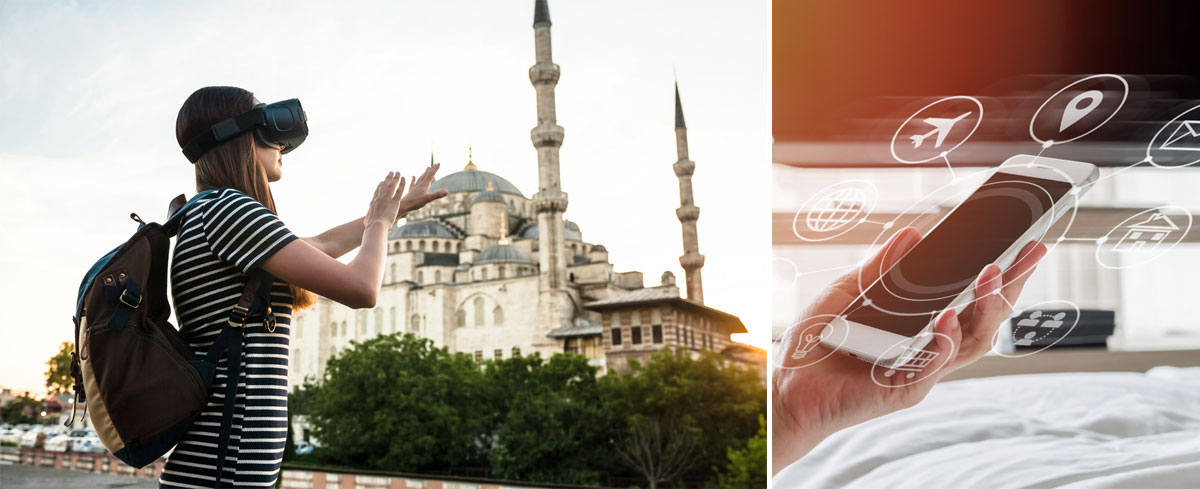The Innovation Has Begun,
Coexisting with COVID-19
In 2021, we suffered the toughest year ever due to the pandemic, following the difficult previous year. The impact that this sudden virus had on all of us was significant. In the never-ending tunnel of this deadly pandemic, the company and its employees have all experienced various changes to their lives in various ways. Now, we are entering the era “Living With COVID-19.” As we face this transition, we would like to look back on the changes we have experienced so far, and try to predict the direction of changes to come.


How countries and businesses adapted to the pandemic in 2021
In response to the spread of COVID-19, countries implemented travel restrictions and social distancing. Utilizing IT technology, working from home has expanded. Last year, in the United States and Europe, when COVID-19 caused a large-scale pandemic, about half of all workers started working from home. In Korea, remote work began too, starting from large IT companies.
Professor Nicholas Bloom of Stanford University, and Professor Steve Davis of the University of Chicago Booth School of Business, et al., predicted in a co-authored report, Why Working from Home will Stick, that “working from home that spread after the COVID-19 pandemic will result in a 5-percent productivity boost in the USA.” The productivity boost is derived mainly from the shorter commuting time ━ but in fact, opinions in the industry are divided.

The advantages of working from home include reduced commuting time, flexible work environment, etc., factors that have played a major role in improving people's quality of life. In particular, as it enabled workers to balance their lives between work and family, it received positive responses. On the other hand, there were also problems of increased working hours or house chore hours because the boundary between home and work became blurred due to working from home. Because of the mixed positive and negative effects, companies are seeking changes to a variety of hybrid work types, rather than just choosing one.
There are more changes caused by COVID-19. Due to the combination of the pandemic and the digital-friendly tendencies of the MZ generation, the so-called "metaverse" market has grown rapidly. Hyundai Motor Company has enabled the test-driving of its Sonata N Line in the virtual space of Zepeto. Potential buyers can experience the Sonata via Zepeto’s video and photo booths where they can create videos and images using their avatars, creating vehicle contents exclusive for the MZ generation and establishing the brand image leading new technology from it.
The financial circles are also working on various promotions and strategic plans using the metaverse. At Toronto-Dominion Bank of Canada, when a VIP client requests investment advice, the investment portfolio is shown through an AR device. In Korea, KB Financial Group Research Institute showed new possibilities through opening a digital branch in Zepeto and operating a digital training center. This year, various strategies of companies for applying the technology of future industry stood out.
There are more changes caused by COVID-19. Due to the combination of the pandemic and the digital-friendly tendencies of the MZ generation, the so-called "metaverse" market has grown rapidly. Hyundai Motor Company has enabled the test-driving of its Sonata N Line in the virtual space of Zepeto. Potential buyers can experience the Sonata via Zepeto’s video and photo booths where they can create videos and images using their avatars, creating vehicle contents exclusive for the MZ generation and establishing the brand image leading new technology from it.
The financial circles are also working on various promotions and strategic plans using the metaverse. At Toronto-Dominion Bank of Canada, when a VIP client requests investment advice, the investment portfolio is shown through an AR device. In Korea, KB Financial Group Research Institute showed new possibilities through opening a digital branch in Zepeto and operating a digital training center. This year, various strategies of companies for applying the technology of future industry stood out.

Corporate innovation is the priority in the era With COVID-19
Finally, we have entered the era of "Living With COVID-19." Interconnected with the prolonged COVID-19, the CEOs of large companies are declaring ESG management and discussing business reorganization. As social demands grow in response to these rapid changes, the management paradigms of companies are also facing changes. In the process, the companies seek and need new innovations for growth and survival.
According to a Boston Consulting Group (BCG) report, the number of companies that consider innovation as their priority is up by 10 percent. This is a very dramatic increase. Having innovation as a priority, and with the will to act, will greatly influence the actual value creation of the organization. Let us check out what we need for a company to innovate, and what innovative companies are preparing for.

Future in 2022 that will change with various innovations
The priority in innovation of companies is technological innovation. In a survey of “the first thing you want to do” in the era of Living With COVID-19, many people responded that they want to travel freely. As if responding to this, the fastest developing sector is travel-tech. Travel-tech means the use of IT in travel services. In other words, it applies IT and e-Commerce solutions to provide satisfactory travel experiences including automated reservation, shorter time, reduced cost, etc.
For now, companies are working on innovations in voice search and voice control systems in the travel industry utilizing smartphones, AI assistant, AI speakers, etc. You can control the lights and heating in the room, or obtain tourist information, without calling the staff to the hotel rooms. Moreover, in the future, robots will provide services such as receiving the guests and giving information when they arrive at the hotel. Some hotels plan to also give robots the work of cleaning and luggage handling.
You would have noticed that there are no coins in our pockets these days. This is a change brought about by non-face-to-face payments. It started for convenience, but now has become the key to tourist marketing. It is expected to continue to grow as it can relieve the stress from the spread of viruses through touching cash or credit cards. In addition, there are tours that enable customers to experience places far away without going outside or experience landmarks of tourist spots through VR.

Innovation is also being applied to the ways we work. COVID-19 has accelerated the need for ways to work-from-home and remote work, and many companies are already implementing them. Jack Dorsey, CEO of Twitter, even sent out an email to all employees that they may continue working from home if they wanted. What is noticeable here is that he gave employees the right to decide on how to work. The employees have already experienced various changes in work, and they now have the choice. Although this may seem like a minor change, it has great implications in that they may bring about more changes in the future.
Korea’s leading companies are also expanding their innovations in technology and the way they work. SK Telecom has announced that it plans to upgrade services for people to enjoy in daily life such as the metaverse, media, OTT, etc., and that it will continue their work-from-anywhere basis. It allows employees to work wherever they can improve their efficiency.
Win-win management, which is one of the principles of ESG, is a type of innovation. Recently, LG Electronics announced that they will help 50 partner companies for mutual growth, and GS THE FRESH promotes win-win growth by encouraging the purchase of local products. Hyundai Glovis is providing safety kits for safe coexistence, which is also an act that fits the ESG practice. These win-win practices existed even before COVID-19, but in the past, it was more like a bonus. Now, the atmosphere has changed in that the companies are actively doing whatever they can in their own ways.
Even at this very moment, the world is changing. Tomorrow, we may need a different innovation from today. Therefore, we need cooperation and smooth communication more than ever before, and we need to have a flexible mindset to adapt to any changes. When we think of innovation as a delightful opportunity rather than a burden, we will be able to adjust to the Living With COVID-19 era more effectively.
Korea’s leading companies are also expanding their innovations in technology and the way they work. SK Telecom has announced that it plans to upgrade services for people to enjoy in daily life such as the metaverse, media, OTT, etc., and that it will continue their work-from-anywhere basis. It allows employees to work wherever they can improve their efficiency.
Win-win management, which is one of the principles of ESG, is a type of innovation. Recently, LG Electronics announced that they will help 50 partner companies for mutual growth, and GS THE FRESH promotes win-win growth by encouraging the purchase of local products. Hyundai Glovis is providing safety kits for safe coexistence, which is also an act that fits the ESG practice. These win-win practices existed even before COVID-19, but in the past, it was more like a bonus. Now, the atmosphere has changed in that the companies are actively doing whatever they can in their own ways.
Even at this very moment, the world is changing. Tomorrow, we may need a different innovation from today. Therefore, we need cooperation and smooth communication more than ever before, and we need to have a flexible mindset to adapt to any changes. When we think of innovation as a delightful opportunity rather than a burden, we will be able to adjust to the Living With COVID-19 era more effectively.
2021.12.01

